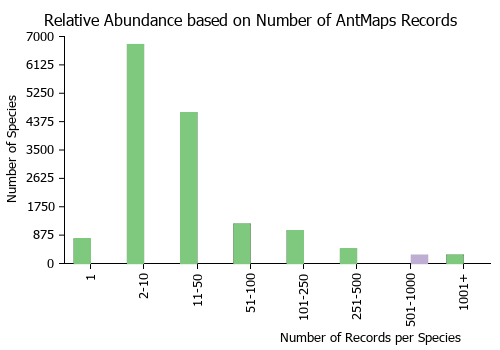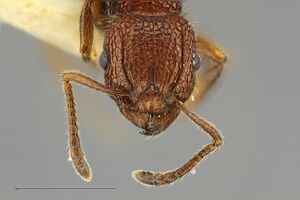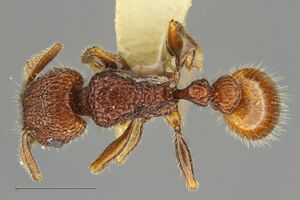Tetramorium spinosum
| Tetramorium spinosum | |
|---|---|

| |
| Scientific classification | |
| Kingdom: | Animalia |
| Phylum: | Arthropoda |
| Class: | Insecta |
| Order: | Hymenoptera |
| Family: | Formicidae |
| Subfamily: | Myrmicinae |
| Tribe: | Crematogastrini |
| Genus: | Tetramorium |
| Species: | T. spinosum |
| Binomial name | |
| Tetramorium spinosum (Pergande, 1896) | |
| Synonyms | |
| |
This species nests in the soil, with the entrance surrounded by a small mound, or under stones. It feeds on seeds and dead insects.
Identification
A member of the Tetramorium tortuosum species group.
Keys including this Species
Distribution
Latitudinal Distribution Pattern
Latitudinal Range: 35.157539° to -19.6°.
| North Temperate |
North Subtropical |
Tropical | South Subtropical |
South Temperate |
- Source: AntMaps
Distribution based on Regional Taxon Lists
Nearctic Region: United States.
Neotropical Region: Mexico (type locality).
Distribution based on AntMaps
Distribution based on AntWeb specimens
Check data from AntWeb
Countries Occupied
| Number of countries occupied by this species based on AntWiki Regional Taxon Lists. In general, fewer countries occupied indicates a narrower range, while more countries indicates a more widespread species. |

|
Estimated Abundance
| Relative abundance based on number of AntMaps records per species (this species within the purple bar). Fewer records (to the left) indicates a less abundant/encountered species while more records (to the right) indicates more abundant/encountered species. |

|
Habitat
Creosotebush scrub, arroyos, arid grassy sites.
Biology
Castes
Worker
Images from AntWeb
   
| |
| Syntype of Xiphomyrmex spinosus. Worker. Specimen code castype00654. Photographer April Nobile, uploaded by California Academy of Sciences. | Owned by CAS, San Francisco, CA, USA. |
   
| |
| . | Owned by Museum of Comparative Zoology. |
Nomenclature
The following information is derived from Barry Bolton's Online Catalogue of the Ants of the World.
- spinosum. Xiphomyrmex spinosus Pergande, 1896: 894 (w.) MEXICO. Cole, 1957c: 209 (m.); Taber & Cokendolpher, 1988: 95 (k.). Combination in Tetramorium: Bolton, 1979: 163. Senior synonym of insons, wheeleri: Bolton, 1979: 163. See also: Smith, M.R. 1938a: 127.
- wheeleri. Tetramorium (Xiphomyrmex) wheeleri Forel, 1901c: 128 (w.) MEXICO. Subspecies of spinosum: Wheeler, W.M. 1915b: 416; Smith, M.R. 1938a: 130. Junior synonym of spinosum: Bolton, 1979: 163.
- insons. Xiphomyrmex spinosus subsp. insons Wheeler, W.M. 1915b: 416 (w.q.m.) U.S.A. Junior synonym of spinosum: Bolton, 1979: 163.
Description
Karyotype
- See additional details at the Ant Chromosome Database.
 Explore: Show all Karyotype data or Search these data. See also a list of all data tables or learn how data is managed.
Explore: Show all Karyotype data or Search these data. See also a list of all data tables or learn how data is managed.
- n = 13, 2n = 26, karyotype = 26M (USA) (Taber & Cokendolpher, 1988).
References
- Mackay, W. P. and E. Mackay. 2002. The ants of New Mexico (Hymenoptera: Formicidae). Edwin Mellen Press, Lewiston, NY.
- Alatorre-Bracamontes, C.E., Vásquez-Bolaños, M. 2010. Lista comentada de las hormigas (Hymenoptera: Formicidae) del norte de México. Dugesiana 17(1): 9-36.
- Bolton, B. 1979. The ant tribe Tetramoriini (Hymenoptera: Formicidae). The genus Tetramorium Mayr in the Malagasy region and in the New World. Bull. Br. Mus. (Nat. Hist.) Entomol. 38: 129-181 (page 163, Combination in Tetramorium, and senior synonym of insons and wheeleri)
- Cole, A. C., Jr. 1957c. Descriptions of sexual castes of some ants in the genera Myrmica, Manica and Xiphomyrmex from the western United States (Hymenoptera: Formicidae). J. Tenn. Acad. Sci. 32: 208-213 (page 209, male described)
- Franco, W., Ladino, N., Delabie, J.H.C., Dejean, A., Orivel, J., Fichaux, M., Groc, S., Leponce, M., Feitosa, R.M. 2019. First checklist of the ants (Hymenoptera: Formicidae) of French Guiana. Zootaxa 4674, 509–543 (doi:10.11646/zootaxa.4674.5.2).
- Pergande, T. 1896. Mexican Formicidae. Proc. Calif. Acad. Sci. (2) 5: 858-896 (page 894, worker described)
- Smith, M. R. 1938a. A study of the North American ants of the genus Xiphomyrmex Forel. J. Wash. Acad. Sci. 28: 126-130 (page 127, see also)
- Taber, S. W.; Cokendolpher, J. C. 1988. Karyotypes of a dozen ant species from the southwestern U.S.A. (Hymenoptera: Formicidae). Caryologia 41: 93-102 (page 95, karyotype described)
- Varela-Hernández, F., Medel-Zosayas, B., Martínez-Luque, E.O., Jones, R.W., De la Mora, A. 2020. Biodiversity in central Mexico: Assessment of ants in a convergent region. Southwestern Entomologist 454: 673-686.
References based on Global Ant Biodiversity Informatics
- Alatorre-Bracamontes, C.E. and M Vasquez-Bolanos. 2010. Lista comentada de las hormigas (Hymenoptera: Formicidae) del norte de México. Dugesiana 17(1):9-36
- Bestelmeyer B. T., and J. A. Wiens. 2001. Ant biodiversity in semiarid landscape mosaics: the consequence of grazing vs. natural heterogeneity. Ecological Applications 11(4): 1123-1140.
- Bolton B. 1979. The ant tribe Tetramoriini (Hymenoptera: Formicidae). The genus Tetramorium Mayr in the Malagasy region and in the New World. Bulletin of the British Museum (Natural History). Entomology 38:129-181.
- Chanatasig-Vaca C. I., E. Huerta Lwanga, P. Rojas Fernandez, A. Ponce-Mendoza, J. Mendoza Vega, A. Moron Rios, H. Van Del Wal, and B. B. Dzib-Castillo. 2011. Effecto uso de suelo en las hormigas (Formicidae: Hymenoptera) de Tikinmul, Campeche, Mexico. Acta Zoológica Mexicana 27(2): 441-461.
- Cook J. L. 2003. Conservation of biodiversity in an area impacted by the red imported fire ant, Solenopsis invicta (Hymenoptera: Formicidae). Biodiversity and Conservation 12: 187195.
- Dattilo W. et al. 2019. MEXICO ANTS: incidence and abundance along the Nearctic-Neotropical interface. Ecology https://doi.org/10.1002/ecy.2944
- Fernandes, P.R. XXXX. Los hormigas del suelo en Mexico: Diversidad, distribucion e importancia (Hymenoptera: Formicidae).
- Gove, A. D., J. D. Majer, and V. Rico-Gray. 2009. Ant assemblages in isolated trees are more sensitive to species loss and replacement than their woodland counterparts. Basic and Applied Ecology 10: 187-195.
- Hernandez, F. Varela and G. Castano-Meneses. 2010. Checklist, Biological Notes and Distribution of Ants (Hymenoptera: Formicidae) from Barranca de Metztitlán Biosphere Reserve, Hidalgo, Mexico. Sociobiology 56(2):397-434
- Johnson R. Personnal Database. Accessed on February 5th 2014 at http://www.asu.edu/clas/sirgtools/resources.htm
- Johnson, R.A. and P.S. Ward. 2002. Biogeography and endemism of ants (Hymenoptera: Formicidae) in Baja California, Mexico: a first overview. Journal of Biogeography 29:10091026/
- LeBrun E. G., R. M. Plowes, and L. E. Gilbert. 2015. Imported fire ants near the edge of their range: disturbance and moisture determine prevalence and impact of an invasive social insect. Journal of Animal Ecology,81: 884–895.
- Lopez, A. S., M. Vasquez-Bolanos, and G. A. Q. Rocha. 2015. Hormigas (Hymenoptera: Formicidae) del Cerro de la Culebra, Arandas, Jalisco, Mexico. Dugesiana 19: 151-155.
- Mackay W. P. and Mackay, E. E. 2002. The ants of New Mexico (Hymenoptera: Formicidae). Lewiston, New York: Edwin Mellen Press, 400 pp.
- Matsuda T., G. Turschak, C. Brehme, C. Rochester, M. Mitrovich, and R. Fisher. 2011. Effects of Large-Scale Wildfires on Ground Foraging Ants (Hymenoptera: Formicidae) in Southern California. Environmental Entomology 40(2): 204-216.
- Moody J. V., and O. F. Francke. 1982. The Ants (Hymenoptera, Formicidae) of Western Texas Part 1: Subfamily Myrmicinae. Graduate Studies Texas Tech University 27: 80 pp.
- O'Keefe S. T., J. L. Cook, T. Dudek, D. F. Wunneburger, M. D. Guzman, R. N. Coulson, and S. B. Vinson. 2000. The Distribution of Texas Ants. The Southwestern Entomologist 22: 1-92.
- Pergande, T. 1895. Mexican Formicidae. Proceedings of the California Academy of Sciences Ser. 2 :850-896
- Rios-Casanova, L., A. Valiente-Banuet, and V. Rico-Gray. (2004). Las hormigas del Valle de Tehuacan (Hymenoptera: Formicidae): una comparacion con otras zonas aridas de Mexico. Acta Zoologica Mexicana 20: 37-54.
- Rocio, C. B., F. Solis Marin, A. Ortega Rubio, H. Romero Schmidt, and C. Arguelles Mendez, 1993. Absence of response of ant numbers to livestock exclosure at baja-california-sur, Mexico. Arquivos de Biologia e Tecnologia 36: 829-837.
- Ríos-Casanova, L., A. Valiente-Banuet and V. Rico-Gray. 2004. Las hormigas del Valle de Tehuacan (Hymenoptera: Formicidae): Una comparacion con otras zonas aridas de Mexico. Acta Zoologica Mexicana 20(1):37-54
- Smith M. R. 1938. A study of the North American ants of the genus Xiphomyrmex Forel. Journal of the Washington Academy of Sciences 28: 126-130.
- Taber S. W., and J. C. Cokendolpher. 1988. Karyotypes of a dozen ant species from the southwestern U.S.A. (Hymenoptera: Formicidae). Caryologia 41: 93-102.
- Van Pelt, A. 1983. Ants of the Chisos Mountains, Texas (Hymenoptera: Formicidae) . Southwestern Naturalist 28:137-142.
- Vasquez-Bolanos M. 2011. Checklist of the ants (Hymenoptera: Formicidae) from Mexico. Dugesiana 18(1): 95-133.
- Vasquez-Bolanos M., and J. L. Navarrete-Heredia. 2004. Checklist of the ants (Hymenoptera: Formicidae) from Jalisco State, Mexico. Sociobiology 43(2): 351-365
- Vasquez-Bolanos, M. 2007. Una especie nueva del genero Tetramorium Mayr (Hymenoptera: Formicidae) de Mascota, Jalisco, Mexico. Dugesiana 14(2):93-97.
- Vásquez-Bolaños M. 2011. Lista de especies de hormigas (Hymenoptera: Formicidae) para México. Dugesiana 18: 95-133
- Vásquez-Bolaños M., G. Castaño-Meneses, and R. Guzmán-Mendoza. 2011. New species of Tetramorium Mayr (Hymenoptera: Formicidae) from Puebla state, Mexico. Dugesiana 40: 452-455.
- Ward P.S. and A.M. Boulton. 2002. Checklist of the ants of the Gulf of California Islands. In Island Biogeography of the sea of Cortes. T.J. Case, M.L. Cody and E. Ezcurra Editors. 690 pp.
- Wheeler W. M. 1901. Notices biologiques sur les fourmis Mexicaines. Annales de la Société Entomologique de Belgique. 45: 199-205.
- Wheeler W. M. 1902. A new agricultural ant from Texas, with remarks on the known North American species. American Naturalist. 36: 85-100.
- Wheeler W. M. 1915. Some additions to the North American ant-fauna. Bull. Am. Mus. Nat. Hist. 34: 389-421.
- Wheeler, G.C. and J. Wheeler. 1985. A checklist of Texas ants. Prairie Naturalist 17:49-64.

